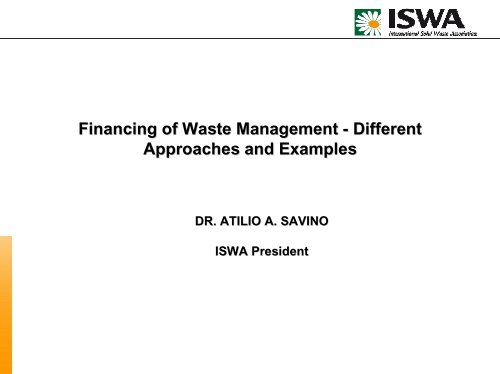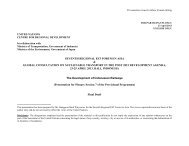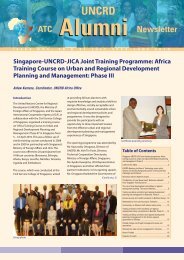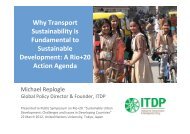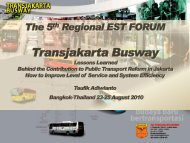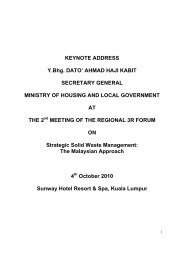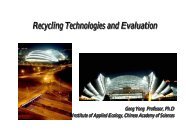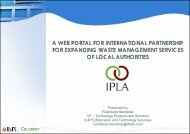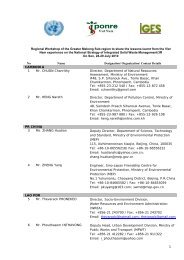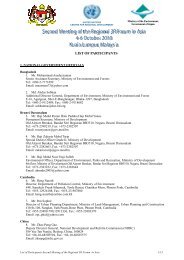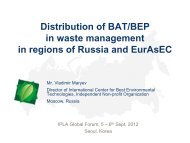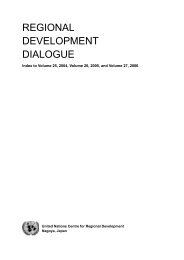Financing of Waste Management - Different Approaches and - UNCRD
Financing of Waste Management - Different Approaches and - UNCRD
Financing of Waste Management - Different Approaches and - UNCRD
You also want an ePaper? Increase the reach of your titles
YUMPU automatically turns print PDFs into web optimized ePapers that Google loves.
<strong>Financing</strong> <strong>of</strong> <strong>Waste</strong> <strong>Management</strong> - <strong>Different</strong><br />
<strong>Approaches</strong> <strong>and</strong> Examples<br />
DR. ATILIO A. SAVINO<br />
ISWA President
<strong>Financing</strong> Options - Overview<br />
� Tax system<br />
– For any waste type<br />
– For special purposes (e.g. l<strong>and</strong>fill tax for contaminated site remediation)<br />
� Fee system<br />
– In general (e.g. municipality sets certain fee <strong>and</strong> charges residents for residual<br />
waste per household, per square metre living space)<br />
– For specific purposes (e.g. integrated disposal fee for refrigerators, fluorescent<br />
tubes)<br />
� Deposit System<br />
– For certain waste types (e.g. glass bottles, plastic bottles)<br />
� Full cost system (all services covered)<br />
– For certain waste types (e.g. Producer responsibility driven systems for<br />
packaging, electric/electronic waste)<br />
� Additional Cost system<br />
– For certain waste types (stakeholders share costs involved for packaging waste)<br />
2
Tax system - Examples<br />
– <strong>Waste</strong> taxes can be cost covering charges where the revenues are<br />
used either to pay for waste disposal services, such as the Dutch<br />
household waste tax, or to finance recycling services, such as the<br />
Swedish battery charge.<br />
– Or, they can be incentive taxes levied to change environmentally<br />
damaging behaviour. Revenues are <strong>of</strong>ten used to further encourage<br />
behavioural change. One example is the German toxic waste charge.<br />
– The third way that a waste tax can be used is as a fiscal environmental<br />
tax, whereby surplus revenues from the tax can be used to finance<br />
budget deficits or shift taxes from labour to resources. Such a change in<br />
the tax system which shifts taxes away from labour <strong>and</strong> capital <strong>and</strong> onto<br />
the use <strong>of</strong> resources is known as an ecological tax reform (ETR).<br />
3
Fee system - Example Vienna<br />
L<strong>and</strong>lord waste charge<br />
City <strong>of</strong> Vienna<br />
Municipal solid waste charge<br />
€ 3,16<br />
52 emptying/year<br />
164,3 € per household<br />
<strong>and</strong> year<br />
4<br />
With the municipal waste charge<br />
the following services are included:<br />
Paper Clear Glass Coloured Glass<br />
Hazardous <strong>Waste</strong><br />
Collection under<br />
supervision<br />
Metals Plastics Bio waste<br />
Info-Hotline<br />
Recycling centres (for<br />
large amounts <strong>of</strong> different<br />
waste fractions from households<br />
<strong>and</strong> bulky waste,<br />
compost for free)
Deposit system - Examples<br />
– Deposit systems can be established for different waste types,<br />
particularly for packaging waste. The objective for this measure is to<br />
reduce littering <strong>of</strong> waste <strong>and</strong> to promote reusable packaging.<br />
– There is a tradition for deposit on refillable/reusable packaging.<br />
Consumers have to pay a deposit for refillable/reusable packaging<br />
when they purchase it. When they bring back the empty packaging to<br />
supermarkets or stores they receive the deposit back. This system<br />
particularly works for glass bottles or PET bottles (they can be refilled<br />
20-50 times).<br />
– There are also a few examples for deposit systems for one way<br />
beverage packaging. In contradiction to refillable packaging the one<br />
way packaging are recycled/recovered after use <strong>and</strong> not refilled.<br />
5
Full cost system/Additional cost system - Examples<br />
– On the basis <strong>of</strong> producer responsibility, which is set in the law,<br />
producers have the obligation to fulfil the legal requirements. This also<br />
means they have to carry at least partly the costs needed.<br />
– Such systems are established particularly for packaging waste.<br />
– Either the system carries the total cost for collection/sorting/recovery <strong>of</strong><br />
packaging waste. Or the municipalities pay part <strong>of</strong> the cost <strong>and</strong> the<br />
system pays part <strong>of</strong> the cost.<br />
6
Various Options for <strong>Financing</strong> <strong>Waste</strong> <strong>Management</strong><br />
Services<br />
Residual<br />
<strong>Waste</strong><br />
Tax/fee<br />
Bio<br />
<strong>Waste</strong><br />
F i n a n c i n g t h r o u g h<br />
Partly tax/fee<br />
Partly industry<br />
Paper<br />
packaging -<br />
non-packaging<br />
Metals<br />
packaging -<br />
non-packaging<br />
White<br />
Glass<br />
Industry<br />
Coloured<br />
Glass<br />
Consumers are provided with a comprehensive <strong>and</strong><br />
convenient collection system for all materials<br />
7<br />
Plastics
Cost for waste management (example Vienna)<br />
Inhabitants <strong>of</strong> Vienna 1.752.365<br />
approx. inhabitants per household 2,21<br />
specif. costs per household <strong>and</strong> year<br />
(without <strong>of</strong>fices, small trade etc.)<br />
specif. costs per household <strong>and</strong> day<br />
(without <strong>of</strong>fices, small trade etc.)<br />
specif. costs per inhabitant <strong>and</strong> day<br />
(without <strong>of</strong>fices, small trade etc.)<br />
0,20 € = one SMS<br />
8<br />
164 €<br />
0,45 €<br />
0,20 €
Balance <strong>of</strong> cost – collection (example Vienna)<br />
400%<br />
350%<br />
300%<br />
250%<br />
200%<br />
150%<br />
100%<br />
50%<br />
0%<br />
Residual<br />
<strong>Waste</strong><br />
Biowaste Metal Glass Plastics Paper<br />
9
CONTACT DETAILS<br />
ATILIO A. SAVINO<br />
asavino@ars.org.ar<br />
Auerspergstrasse 15, Top 41<br />
1080 Vienna<br />
Austria<br />
Tel: Tel +431 253 6001<br />
Email: Email iswa@iswa.org<br />
Venezuela 931 2do. Piso<br />
Buenos Aires, C1095AAS.<br />
Argentina<br />
Tel: Tel +54114342-6368<br />
+54114342 6368<br />
Email: Email ars@isalud.edu.ar


